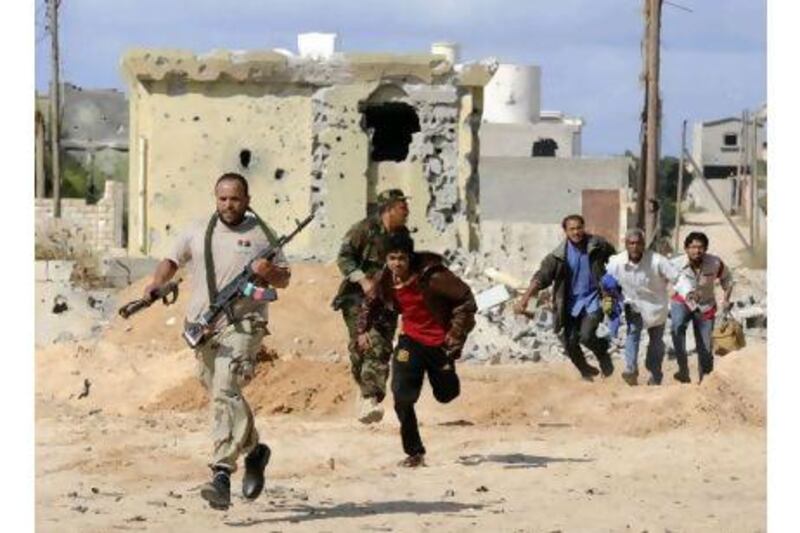SIRTE, LIBYA // Forces for the interim government of Libya hoisted their flag over the centre of Bani Walid yesterday, signalling that one of the last bastions of support for Col Muammar Qaddafi may soon be subdued.
Yet few were making any predictions when the liberation of Libya would be complete.
There were still pockets of resistance in Bani Walid and in the deposed Libyan leader's hometown of Sirte, where Qaddafi loyalists have been under siege for weeks. There was little or no sign of the disorganised forces of the interim National Transitional Council (NTC) making any progress yesterday.
Libya's new leaders say they will only begin the move to democracy after they capture the city.
This fight long ago gave way to exhaustion. Last week, NTC fighters leaned against the pockmarked walls of buildings in Sirte, silent and weary.
They sprinted across alleyways to avoid sniper fire and chanted "God is great" to passing television cameras.
But there was a sense of futility in the fighting. For each round of sniper fire from pro-Qaddafi loyalists, NTC forces retaliated with tank fire, rockets, and anti-aircraft guns.
Some fighters had already lost too much for questions about the end of the war to matter much.
"This war is supposed to be over soon," said Muftah Musbah, 27, from Ajdabia, before joining a group of scouts heading into enemy neighbourhoods. "But it's too late. They killed my cousin yesterday."
Few thought the conquest of Sirte would be easy. Yet no one thought just how prescient Seif el-Islam was in late August when the most well-known of Col Qaddafi's sons declared: "If you think entering [Sirte] is a sea cruise, you're dreaming."
One reason for the intensity of the pro-Qaddafi resistance here may be the sheer beneficence that the Libyan leader showered on his hometown.
Before he came to power in 1969, Sirte was a backwater. With the aid of the billions ploughed into it, it became a major port, with a luxurious conference centre, acres of new housing and several palaces built to the colonel's specifications.
"Yes, he was very humble," said an NTC officer, Ahmed El-Zlitny, with a wink as he surveyed the colonel's edifices.
That the former Libyan leader's largesse was enjoyed by only a few of his people is obvious in the Ouagadougou Conference Centre, a facility named after the capital of Burkina Faso and where the self-proclaimed "King of Africa" kept a private office and bedroom, and staged showcase events.
One torn banner, left over from a summit of African leaders, read: "We are Here … Arabs and Africans Making Our Common Future". Placards with slogans such as "Shame on agents" and "Sirte is the summit of high hopes" adorn the centre's marble walls.
Crouching in the centre's dark conference hall and smoking a cigarette, Ahmed Ismail Mahmoud, a 25-year-old NTC fighter, marvelled at the plush chairs, the giant projection screen and the arrays of translation headsets.
"It makes me feel that I didn't even live my life in Libya," he said.
While the interim government portrays the winding-down war as a conflict between good and evil and darkness and light, the protracted battles for Sirte and Bani Walid indicate that neither side in this conflict has a corner on virtue.
There have been persistent but unconfirmed reports of pro-Qaddafi fighters executing suspected supporters of the revolution and burying them in secret graves. NTC fighters manning checkpoints along the roads to Misurata and Benghazi taunted suspected Qaddafi loyalists, arresting men with as little evidence as one soldier's claim that the man had supported Col Qaddafi or was an enemy fighter.
At Checkpoint 50, the main gateway into Sirte on its eastern edge, a young man from Sirte was forced to clean up rubbish around the checkpoint building. A large, baby-faced soldier wearing an orange shirt oversaw the man's efforts, slapping him again and again on the back of the head.
The fighters looking on explained how the casual cruelty was a case of tables being turned - while in custody earlier this year, they claimed, the soldier had been tortured by the man now collecting trash. The only evidence was the soldier's insistence it was true. Later, the prisoner was carted away in the back of a pickup truck to one of dozens of makeshift detention centres holding Qaddafi loyalists.
If this and other incidents during a brief wait at the checkpoint were any indication, the paranoia and fear that characterised life under Col Qaddafi will not dissipate soon.
The thorough search of every vehicle passing through the checkpoint revealed in one case was a diaper bag disguising a collection of pro-Qaddafi propaganda, pictures of the former leader and a partially burnt diary that recounted how the young woman author had been worried about the coming battle in Sirte. The bag was seized and the owner was allowed to continue on to Benghazi after the commander at the checkpoint, Farag Sheiter, decided the possession was not criminal enough to warrant her arrest.
A dark-skinned man from Tawurgha, a city from which Qaddafi's troops launched attacks on Misurata, may have not been so lucky.
He was teased and harassed for more than an hour because pro-Qaddafi songs were discovered on his mobile phone. The man earlier had said he was on the side of the revolutionaries.
As the man pleaded with the soldiers to let him through, one said ominously in Arabic: "What would I do with you if there wasn't a journalist present."
As the soldier's voice trailed off, it was unclear whether he was asking a question or issuing a threat. The pleading man was escorted away, his fate unclear.
* With additional reporting by Reuters





